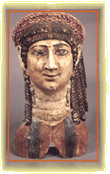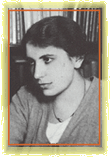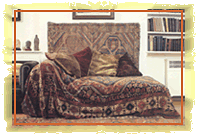 |
 |
 |
|
|||
|
Finding Freud Most people I know who study psychology are screwed up. They're looking for the answers to their own problems. On the basis that if it's not broke don't fix it, I've never touched a psychology book in my life...I'm too nervous about upsetting the delicate equilibrium. So this isn't a trip I expect to enjoy.
But then, how could you not enjoy Vienna, home of the waltz, with its glorious coffee houses and their fantastic array of cakes, where you can spend hours losing dollars, gaining pounds. Then there are the museums and palaces and finally the home of Sigmund Freud, the founder of psychoanalysis. From St. Stephen's Cathedral in the center of Vienna, it's only a short tram ride to his house at number 19 Berggasse. All I know about Freud is that he's obsessed with sex being the cause of all our problems. So it makes me laugh when I arrive at his house to discover the shop opposite sells sexy lingerie. Not sure how some of his patients would have coped with that. Freud lived and worked here for nearly half a century from 1891. Vienna was then at the heart of Europe, a melting pot where east met west and a center for radical creativity.
From the art of Gustav Klimt, which you can see at the Belvedere Palace, to the music of another Gustav, Mahler, which I was lucky enough to hear in a concert. Mahler was just one of Freud's many famous patients. Others became famous for their idiosyncrasies, like the Wolf Man. Or the Rat Man (and this one's really gross), who heard this story of a Chinese torture which involved tying a bucket full of rats onto someone's buttocks. The rats escape by gnawing their way through their victim's anus. The Rat Man became obsessed with the story, believing his family was about to be punished likewise and it was all his fault. After months of analysis Freud pinned the cause down...to a problematic early sexual development. Well he would, wouldn't he? Freud's apartment is now a museum. His hat and walking cane hang in the foyer. The waiting room is furnished just as it was over 60 years ago when Wolf Man, Rat Man and all the other distinguished screwballs queued for consultations. You'll also see some of his huge collection of ancient antiquities. Freud was an avid collector, these statuettes, vases and bowls excavated from deep within the earth reminded him of his psychoanalysis, delving for buried triggers to a person's neuroses.
In another room, videos hosted by Freud's late daughter Anna show fascinating black and white flickering home movies of Freud and his family towards the end of his life. He's a slightly stern grandfather figure: not unfriendly, but I'm not sure I'd want to discuss my sex life with him. One of the strangest things I discover here is Freud's collection of jokes, many of them Jewish. Our guide tells me one. [Guide tells joke] I didn't laugh either. Freud, himself a Jew, didn't collect these gags for a weekly stand-up routine at the local comedy club. He actually wanted to analyze them to find out why they were funny (or not) and how the way you respond to jokes reveals some of your hidden self. This guy had to analyze everything! But what also emerges through the displays here is what a genius Freud was. He revolutionized our approach to psychological problems. While others were surgically attacking the psychologically disturbed, he was inventing the "talking cure": psychoanalysis. Howard Markel, a professor from the University of Michigan, is another who's come to pay homage.
Not far from the museum is the Sigmund Freud Park and Memorial. In the Jewish section of Vienna's Central Cemetery you'll find his parents' graves. But there's something missing in all this: the couch.
In 1938, persecuted by the Nazis, racked with agony from the jaw cancer that was to kill him the following year, Freud fled Austria for the safety of his family. Everything - his books, antiquities and furniture -- came with him to London. This is Hampstead in North London and Freud's house, a beautiful brick, three-story detached English home. It too is now a museum.
Erica Davies is the museum director. I love this room full of books, pictures, and rich dark carpets. And of course there it is, all roped off, the couch. Think of the bottoms that have been on that: Mahler's, Salvador Dali's, H.G. Wells's...
I can't believe it! She said yes!
We stay chatting for quite some time, me on the couch, Erica in Freud's seat just behind me. Between Vienna and London I'd done some reading up on Freud. I got all spooked out about this idea of psychosexual development and the Oedipus complex. I was about to become a father. I can tell you, thinking about your child's sexual journey through life is about as discomforting as imagining your parents still having sex. A couple of weeks later my daughter arrives: And there she lies in her crib my adorable little smasher. Innocent. That's how she'll stay. Me too. Psychology? Nah that's a Pandora's box you can keep shut, thank you. But I'll say one thing for Freud, he had a great sofa! From London, this is Martin Stott for The Savvy Traveler.
|
 | American Public Media Home | Search | How to Listen ©2004 American Public Media | Terms of Use | Privacy Policy |





